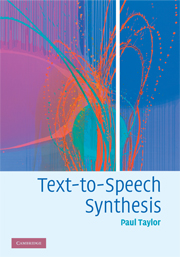Book contents
- Frontmatter
- Contents
- Foreword
- Preface
- 1 Introduction
- 2 Communication and language
- 3 The text-to-speech problem
- 4 Text segmentation and organisation
- 5 Text decoding: finding the words from the text
- 6 Prosody prediction from text
- 7 Phonetics and phonology
- 8 Pronunciation
- 9 Synthesis of prosody
- 10 Signals and filters
- 11 Acoustic models of speech production
- 12 Analysis of speech signals
- 13 Synthesis techniques based on vocal-tract models
- 14 Synthesis by concatenation and signal-processing modification
- 15 Hidden-Markov-model synthesis
- 16 Unit-selection synthesis
- 17 Further issues
- 18 Conclusion
- Appendix A Probability
- Appendix B Phone definitions
- References
- Index
1 - Introduction
Published online by Cambridge University Press: 25 January 2011
- Frontmatter
- Contents
- Foreword
- Preface
- 1 Introduction
- 2 Communication and language
- 3 The text-to-speech problem
- 4 Text segmentation and organisation
- 5 Text decoding: finding the words from the text
- 6 Prosody prediction from text
- 7 Phonetics and phonology
- 8 Pronunciation
- 9 Synthesis of prosody
- 10 Signals and filters
- 11 Acoustic models of speech production
- 12 Analysis of speech signals
- 13 Synthesis techniques based on vocal-tract models
- 14 Synthesis by concatenation and signal-processing modification
- 15 Hidden-Markov-model synthesis
- 16 Unit-selection synthesis
- 17 Further issues
- 18 Conclusion
- Appendix A Probability
- Appendix B Phone definitions
- References
- Index
Summary
This is a book about getting computers to read out loud. It is therefore about three things: the process of reading, the process of speaking, and the issues involved in getting computers (as opposed to humans) to do this. This field of study is known both as speech synthesis, that is the “synthetic” (computer) generation of speech, and as text-to-speech or TTS; the process of converting written text into speech. It complements other language technologies such as speech recognition, which aims to convert speech into text, and machine translation, which converts writing or speech in one language into writing or speech in another.
I am assuming that most readers have heard some synthetic speech in their life. We experience this in a number of situations; some telephone information systems have automated speech response, speech synthesis is often used as an aid to the disabled, and Professor Stephen Hawking has probably contributed more than anyone else to the direct exposure of (one particular type of) synthetic speech. The idea of artificially generated speech has of course been around for a long time – hardly any science-fiction film is complete without a talking computer of some sort. In fact science fiction has had an interesting effect on the field and our impressions of it. Sometimes (less technically aware) people believe that perfect speech synthesis exists because they “heard it on Star Trek”. Often makers of science-fiction films fake the synthesis by using an actor, although usually some processing is added to the voice to make it sound “computerised”.
- Type
- Chapter
- Information
- Text-to-Speech Synthesis , pp. 1 - 7Publisher: Cambridge University PressPrint publication year: 2009



